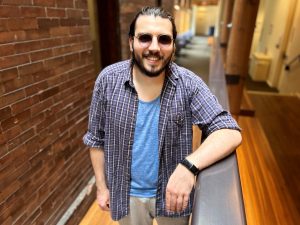
Second year PhD student Renato Zimmermann moved to Canada as a newly-admitted undergraduate six years ago. A research assistantship during those studies sparked a deep curiosity about complex questions in economics. His admission into graduate studies didn’t come as a surprise.
“Renato was one of the best undergraduate students I’ve ever had; he was always very inquisitive. He has three of the most important qualities, in my view. He is very curious about economics and wants to understand things deeply. He is very resilient and perseveres through challenges. Third, he works hard, goes into detail and actively identifies and addresses problems without letting obstacles stop him,” said Associate Professor Eduardo Souza-Rodrigues.
Adriano Macedo of the Department of Economics interviewed Renato about the curiosity, complex questions, and the realities of life as a PhD student.
Adriano Macedo: Since your graduate studies were inspired by a research assistantship, could you describe a research project that you found particularly fulfilling?
Renato Zimmermann: I can’t pick a favorite project, but recently I’ve had a really good time working on my own research. I’ve been trying to get something started from scratch, taking my time and skipping no steps, and found that even the parts I was most scared about turned out to be quite enjoyable. I’ve only written proof for courses and never had the best time doing them, but for some reason when I had to write proof for my research, I felt it was quite fulfilling.
AM: Any thoughts for your research going forward after completing your first year?
RZ: I plan to continue working on my current project about complex interactions in production networks and hopefully turn it into something worthwhile. I’m still figuring things out, but I’m excited to put my energy into my own research. Taking courses is great, but I didn’t come here for that. Maybe in a few years I’ll miss the coursework, but for now I can’t wait to get my hands dirty.
AM: What advice would you give to incoming PhD students on how to prepare for their first year?
RZ: Make sure you pass your comprehensive exams, but don’t forget why you’re here. Taking the core courses was a dreadful experience, and I often felt lost and unmotivated. You might end up feeling the same way, so make sure to take time every day — or at least every week — to delve into your own research interests. Attend seminars and study groups whenever possible. A big part of delving into a field is to recognize that there’s a lot you still don’t know about it. Don’t let that take you into a spiral. Instead, focus on maintaining the sense of wonder that got you here in the first place.
AM: Your interests span from economics to heavy metal music and historical films. How do you see these diverse interests influencing your academic perspective?
RZ: I find it important to keep my thoughts and logic flexible. When studying something in depth, it is easy to fall into the trap of complacency. I fear that as I become more specialized in a topic, I might limit myself to the most common views and approaches. Taking time to deconstruct a song or movie, and try to understand its logic, is my way to stretch my logic muscles. I don’t think the genre of movie or music really matters as much as the act of analyzing something that is completely irrelevant to my research. I’m far from an athlete, but I guess that stretching a muscle is the opposite of contracting it, yet stretching improves your performance in physical activities that involve muscle contraction. Why not take the same approach with our brain muscles?
Return to the Department of Economics website.
Scroll more news.
